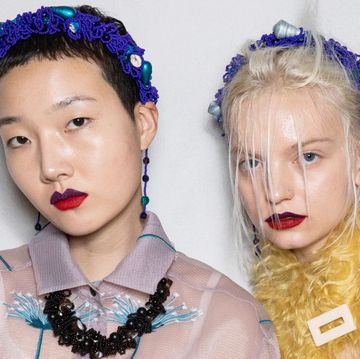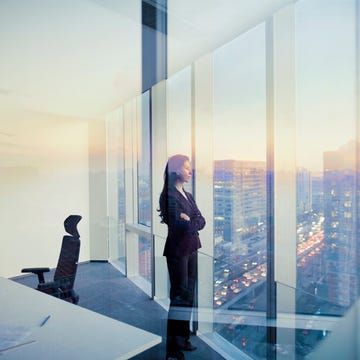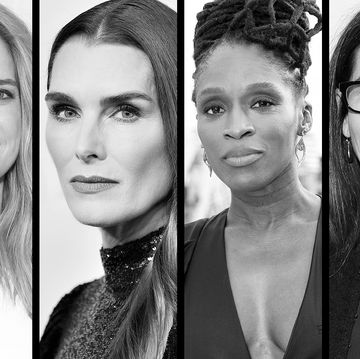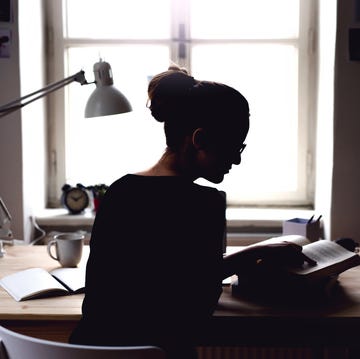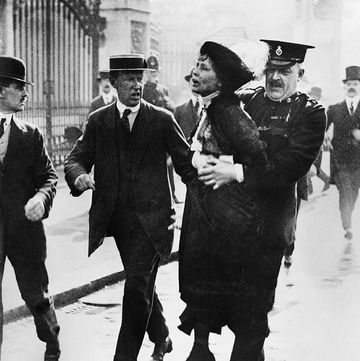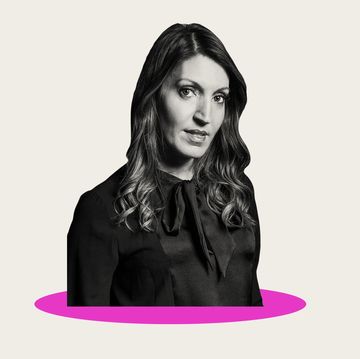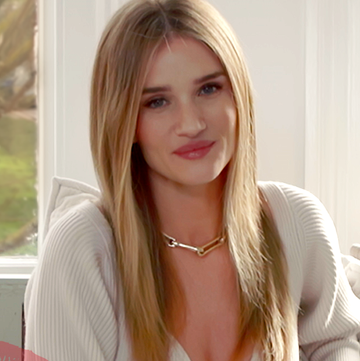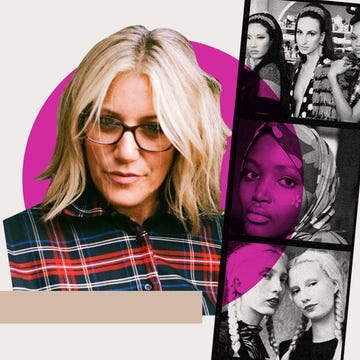20 Of The Most Motivating Feminist TV Shows And Moments, Ever
From 'I May Destroy You' to 'Orange Is The New Black'
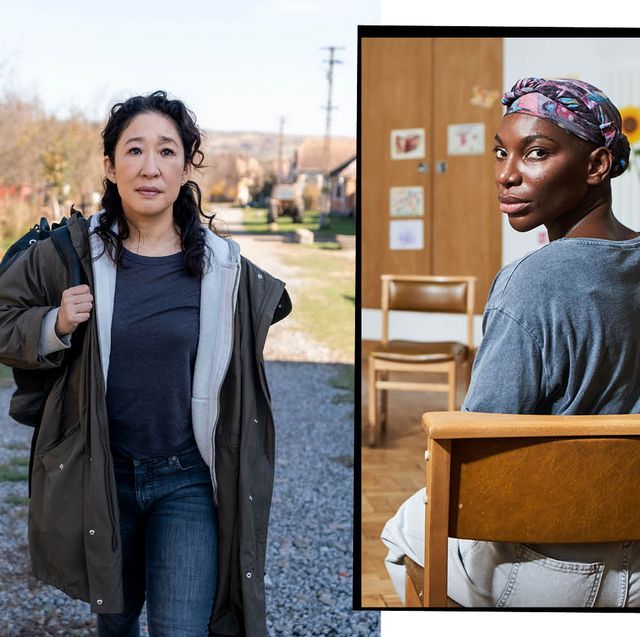
We can read feminist books and literature, decorate our homes as a homage to trailblazing women and continue to have conversations advancing the rights of women around the world to educate both ourselves and others about the historical and present experience of women.
Another medium to articulate, learn and inform people about feminism and feminist issues in the modern day is through fictional television series.
Over the years, there have been some incredible women-led shows, storylines and moments in TV. From Fleabag to I May Destroy You, which put a woman's story front and centre and challenged the preconceptions of how female characters should be, look and act, to shows like Friends and Game of Thrones, which didn't always get it right but gave us bombshell feminist moments conveying the power of women through quotes and story arcs.
To celebrate International Women's Day and Women's History month, we rounded up the 20 most feminist TV moments in recent memory.
I May Destroy You, 2020
Michaela Coel's 2020 show I May Destroy You was one of the bravest TV shows we've seen in recent years.
Depicting the vast spectrum of sexual assault and consent - date rape, a male partner removing his condom during sex without consent, a threesome that wasn't as consensual as it had initially seemed - in a nuanced, thoughtful and powerful medium, I May Destroy You was one of the most thought-proviking shows we've ever seen.
Accurately portraying the trauma of sexual assault while serving as an education to viewers on the narrative surrounding rape, Coel's masterclass in writing also tackled period sex and white privilege (especially between women), before culminating with a powerful ending centred around the sexual assault survivor, not the perpetrator.
High Fidelity, 2020
The fact that this show (which was agonisingly cancelled after just one series) was a remake of the 2000 film and adaptation of the 1995 novel, except this time featured a Black woman as the lead character is feminist in itself.
Zoë Kravitz (whose mother Lisa Bonet starred in the original) played Rob, a recently single and heartbroken woman approaching her thirties and figuring out which route her life should take. Sound like a standard? Well, it's actually not. We soon find out that Rob is complicated and layered, a woman who has made mistakes in her relationships too.
Sex Education, 2019
Since bursting onto Netflix with particularly high viewing numbers, Sex Education has been lauded for its inclusive and honest depiction of sex and sexuality.
Writer Laurie Nunn has equally created a host of fascinating, fearless and layered female characters too. From Gillian Anderson as sex therapist mother Jean, to Emma Mackey's complex and bold Maeve, to Patricia Allison's self-assured Ola, the show is not short of iconic women.
One of the most poignant celebrations of the variety of female characters came at the end of season two when, after being sexually assaulted on a bus, a shaken Aimee (Aimee Lou Wood) is supported by female students from school who are all from different cliques but bond over their shared experiences of sexual harassment and assault.
Shrill, 2019
Based on author Lindy West's memoirs, the sitcom follows Saturday Night Live's brilliant Aidy Bryant as Annie, an aspiring writer from Portland who is trying to navigate her career, the relationship she has with her body, dating, useless boyfriends and maintaining a close and good relationship with her parents all at the same time.
From the moment Annie confronts her sexist internet troll to the empowering body diverse and inclusive pool party she attends with best friend Fran (played wonderfully by British actor Lolly Adefope) to when she finally realises she doesn't have to put up with the rubbish aimed at her from her boss or boyfriend, Shrill is a refreshing watch.
Doctor Who, 2018
A historical feminist moment in British TV came in 2018, when Jodie Whittaker became the first female Doctor Who in the TV shows' 55-year-history.
Following 12 male actors, this time the Doctor embodied a woman for its 13th human form change, with Whittaker retaining her Yorkshire accent for the character too.
The moment saw a hooded figure walk through a forest before Doctor Who summoned the Tardis and Whittaker pulled down her hood and walk into the time travelling device.
Killing Eve, 2018
One of the most successful shows in recent years has two women at the forefront. Actor Sandra Oh plays Eve, the MI6 intelligence officer at the top of her game who is hellbent on finding the mysterious female assassin Villanelle (Jodie Comer). Comer meanwhile adds a much-needed dose of humour, thrill and layers to her deeply terrifying - though, in some ways endearing? - character.
With all three seasons featuring different female lead writers - Waller-Bridge, Emerald Fennel and Suzanne Heathcote - it's no wonder this cat-and-mouse spy drama was such a game changer.
The Handmaid's Tale, 2017
Though Margaret Atwood's dystopian novel of the same name about a world in which women's rights are stripped and their sole purpose is to provide children for the upper classes after fertility levels have dwindled had been adapted for film before, the TV series - which extended beyond the novel's remit - hit harder.
Elisabeth Moss, Alexis Bledel and Samira Wiley portrayed the handmaids so powerfully. In the series, the narrative's timeline often shifts between showing their lives before their rights were eroded (access to contraception stopped, no bank accounts in their own name and the freedom to live their life authentically to express their sexual orientation and sexuality prevented) and the realities after they were captured by the Gilead regime.
There was something about the timing of the show too, with the series arriving as women took to the streets in their thousands wearing pussy hats at the women's marches, demanding their rights continue and are amplified after a man who had boasted about 'grabbing women by the p*ssy' had been elected as US president in 2016.
As well as reinforcing and reminding us of the horrors of an erosion of women's rights, uplifting moments during the series - like when the handmaids stand together and refuse to kill Janine - showed that women will stand together and fight even during the most devastating and dangerous of times.
GLOW, 2017
The hit Netflix show, following the 'Glorious Ladies of Wrestling', featured a female-strong line up of actors all playing physically and mentally strong athletes.
As actor Alison Brie herself has said, the first season's storyline was not about a romantic relationship, rather it chronicles the relationship between two former friends (Ruth and Debbie - the latter played by Betty Gilpin).
'I think female friendships are very powerful, and sometimes it’s even more gutting when they sour. And I just feel like that is at the heart of what makes this a really feminist show, that the lives of these women don’t really revolve around men at all,' Brie previously told The Cut.
Fleabag, 2016

Phoebe Waller-Bridge made waves with her one-woman play turned TV series following a flawed, relatable and grieving central character.
In season one and two, Fleabag - her name is never revealed - is grieving over the death of her late mother and best friend, struggling financially, enjoying sex and her independence and making personal strides of growth. Importantly, Waller-Bridge made Fleabag multi-dimensional, she is someone who loves and feels pain, yet has also made bad choices in her personal life.
Through Fleabag, women's voices are amplified, for example when she breaks the fourth wall or coveys exactly how she feels to Kristen Scott Thomas' cameo as a celebrated businesswoman who discusses the 'life of pain' women go through in season one.
The latter example is one of the most stirring accounts of womanhood and women's bodies on TV in recent memory, and marks a hugely feminist moment in TV history.
'Women are born with pain built in. It’s our physical destiny – period pains, sore boobs, childbirth. We carry it within ourselves throughout our lives. Men don’t. They have to seek it out. They invent all these gods and demons so they can feel guilty about things, which is something we do very well on our own. And then they create wars so they can feel things and touch each other and when there aren’t any wars they can play rugby,' says Scott Thomas.
'We have it all going on in here, inside. We have pain on a cycle for years and years and years, and then just when you feel you are making peace with it all, what happens? The menopause comes. The f*cking menopause comes and it is the most wonderful f*cking thing in the world. Yes, your entire pelvic floor crumbles and you get f*cking hot and no one cares, but then you’re free. No longer a slave, no longer a machine with parts. You’re just a person.'
Black-ish, 2014
Tracee Ellis Ross, Yara Shahidi and Caila Marsai Martin have all brought memorable female roles to the Johnson family in Black-ish. There's head of the family Rainbow (Ellis Ross), a doctor and mother-of-four, fun-loving, confident and brave Zoey (Shahidi) and genius and outspoken Diane (Martin).
Writer Kenya Barris' show is critically acclaimed for tackling social justice issues head on and providing an educational experience too, on topics like police brutality and the importance of celebrating Juneteenth.
In its sixth season, the show featured an episode 'Feminisn't' focussed on Rainbow as she joins women's marches and women's groups and tries to get her youngest daughter interested and identifying with feminism.
As ever, Black-Ish delves into all aspects of an issue, including white feminism and the need for an understanding of the intersectional experiences Black women face, how men should understand feminism and more.
Orange Is The New Black, 2013
The show that catapulted icons Uzo Aduba, Laverne Cox and Danielle Brooks to the mainstream, OINTB told the stories of female characters who had typically been excluded from storytelling and television.
With a dominantly female-led cast, putting the concept of the Bechdel test purely to bed, the show's success, reception and propelling to fame of its actors proves its importance.
From Piper's speech deriding the patriarchy for her 'self-hatred', to raising the actual issue of the accessibility of tampons and sanitary towels for inmates (they only became free for UK inmates in 2019), the show raised encouraged conversations about a woman's place, equal rights and respect in society.
Inside Amy Schumer, 2013
One of the most memorable commentaries on the ageism discrimination high-profile women in the entertainment industry face came via Amy Schumer's Inside Amy Schumer sketch show, when she was joined by some very impressive colleagues.
Starring writers and actors Tina Fey, Julia Louis-Dreyfuss and Patricia Arquette, the three women - all in their forties and fifties - were celebrating their 'last f*ckable day'.
'In every actresses life the. media decides when you finally reach a point where you're not believably f*ckable anymore,' Dreyfus explains to Schumer in the sketch.
Girls, 2012
Sex and the City reinvented... Co-creators Lena Dunham and Jenni Konner's Girls chronicled four twenty-something women and simultaneously overturned the notion that female TV characters must be likeable.
There was Hannah's privileged narcissism, Jessa's refusal to be accountable for her actions, Marni's selfishness and Shoshanna's judgemental tendencies. But there was also a lot of love, game-changing portrayals of sex, the tackling of feminist issues like abortion, witty and intelligent writing of female characters and refreshing depictions of body image.
Scandal, 2012

Based on real-life crisis management expert Judy Smith, Kerry Washington's character Olivia Pope was a powerful, methodical and practical woman 'handling' the problems of the elite.
Unbelievably, Washington became the first Black female lead on American network television in 40 years when she signed on to the Shondaland production in 2012.
Though Pope is the woman who appears to have it all under control (just look at her crisp and tailored wardrobe), TV producer Shonda Rhimes and Washington portray an intelligent and capable woman who is also flawed and subject to making wrong decisions in her personal life.
One particularly badass feminist moment? When Olivia tells Fitz (aka the President of the US) that he is not entitled to her in the second season.
'I am not a toy you can play with when you're bored or lonely or horny, I am not the girl the guy gets at the end of the movie. I am not a fantasy, you want me, earn me,' she says.
Game Of Thrones, 2011

*Spoiler alert*
Who run Westeros? Girls!
Whether it's the ever so slightly unhinged but ultimately badass Cersei Lannister (Lena Heady) who outsmarts every man around her, Sansa Stark (Sophie Turner) carving her own path to Queen of the North, Daenerys Targaryen(Emilia Clarke) literally birthing previously extinct dragons and leading an army of previously hugely misogynist Dothraki or Arya (Maisie Williams) killing the Night King and ending the war singlehandedly, the women in Game Of Thrones are the characters worth paying attention to. Sorry, Jon Snow.
Parks And Recreation, 2009
This show brought us Galentine's Day, before it was largely commercially co-opted. Amy Poehler's ambitious, independent and fiercely feminist local government councilwoman Leslie Knope will forever be a 2010s feminist icon.
With photos of Madeline Albright, Michelle Obama and Hillary Clinton adorning lead character Leslie Knope's Pawnee, Indiana office, to meme-able feminist slogans like 'ovaries before brovaries' and 'uteruses before duderesus' (we see what she did there), some of the sitcom's best-loved episodes were based on feminist thought and arguments.
In one episode, Knope tries to reform the Miss Pawnee beauty pageant, embarking on very ambitious promotions after giving birth to triplets, when she and April Ludgate-Dwye (Aubdrey Plaza) become rubbish collectors to prove they have the strength to do it and when some of the local girls' football team want to transfer to the boy's team.
Mad Men, 2007

Though set in the very dominated world of advertising in the 1950s, the growth of several female characters were also chronicled on the hit drama Mad Men.
From Peggy Olson becoming the first post-WWII female copywrighter at Sterling Cooper to eventually a creative director good enough to rival her boss Don Draper, to Joan who divorces her abusive husband, raises her son, leaves a misogynistic company and starts her own, to Sally - who we witness grow up into a bold, fearless young woman - we came to respect and admire the women fighting the patriarchy in their own ways in the series.
Sex And The City, 1998

Don't get us wrong, there are a lot of outdated flaws when it comes to viewing Sex and the City through a feminist lens. Cynthia Nixon (who had the most feminist character of them all in Miranda Hobbes) put it best herself when she told IndieWire in 2019: 'There was so much debate when [Sex and the City] came out about whether it was a feminist show or not, which I always thought was stupid – of course it’s a feminist show... But I think it has a lot of the failings of the feminist movement in it. In that it’s like white, moneyed ladies who are fighting for their empowerment. In a bit of a bubble.'
Credit where credit's due, with a nuanced anaylysis we have to take a moment to congratulate Samantha Jones (played by Kim Cattrall) on some of her brilliant one liners and attitudes. Staying true to herself, always maintaining her independence, her sexual freedom and stressing the importance of female pleasure to anyone who would listen, the fact Cattrall played this character in the 1990s is quite revolutionary.
One of the most memorable lines from the show (well, technically the sequel film, but who are we to be picky?): 'I love you, but I love me more.'
Buffy The Vampire Slayer, 1997

A 1990s feminist icon, Sarah Michelle Gellar's Buffy was not only a female slayer of vampires but routinely demonstrated to the arrogant, predominantly male vampires and villains just how foolish they were to think they could outsmart her.
Friends, 1994
Airing from the 1990s to the 200s, Friends does contain many outdated references, from portrayals of toxic masculinity (Ross' aversion to a male nanny is still extremely problematic) to offensive statements and jokes about the LGBTQ+ community, to a very whitewashed depiction of New York City.
Rather than praising the whole show for its portrayal of women, there were instead a few moments and one-liners, championed by the three female leads of the show which stand out as feminist moments and arguably can be considered ahead of their time when it came to depictions of women on TV.
For instance, there was the time when Rachel told Ross that she is more than capable of raising their child herself, the now-famous 'No uterus, no opinion' line when he downplays the pain of her Braxton Hicks contractions, the three lead female characters unashamedly expressing their sexuality, including Monica explaining the female erogenous zones to Chandler. And let's not forget the characters' wardrobes, for example Rachel and Monica's iconic 'Girl' slogan tee and sweatshirts.

Olivia Blair is Entertainment Editor (Luxury) at Hearst UK, working across ELLE, Esquire and Harper's Bazaar. Olivia covers all things entertainment and has interviewed the likes of Margot Robbie, Emma Stone, Michaela Coel and Ryan Gosling over the years.
Watch Next

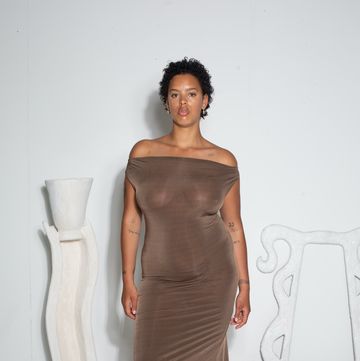
29 Emerging Female Designers To Know Now
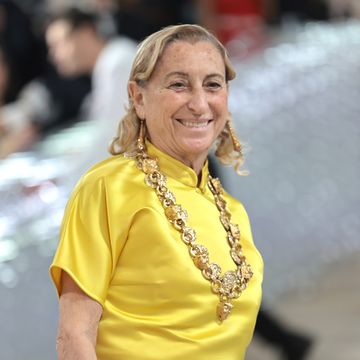
Female Fashion Designers Share Inspirations
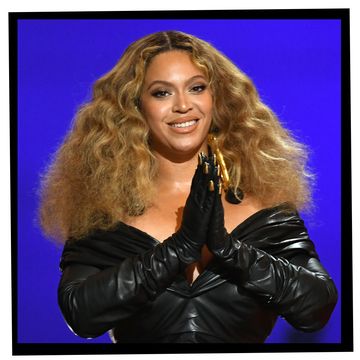
27 Famous Feminists Who Speak The Truth
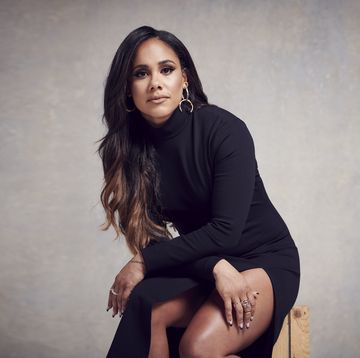
Interview: Alex Scott On Change And Women In Sport
